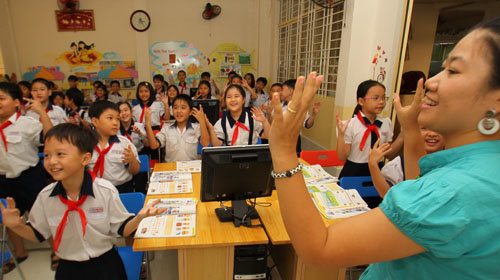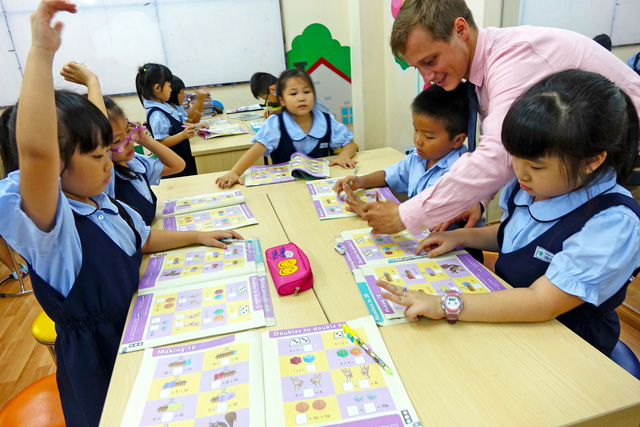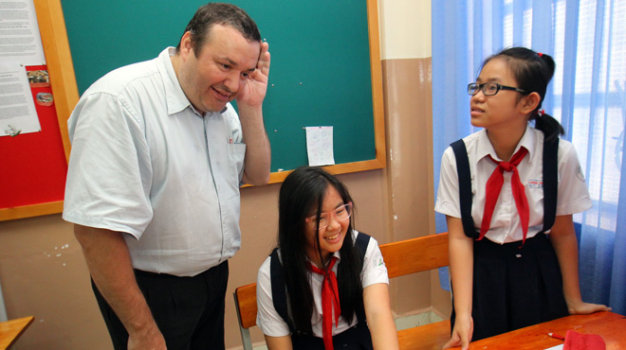An official statement from an education department leader in Ho Chi Minh City, who said giving students English names during language classes is “against Vietnam’s traditional education,” has sparked fresh debate among Tuoi Tre News readers.
Unlike the controversial rule to ban audiovisual tools from English teaching in citywide primary schools, the ‘name issue’ is winning support from English teachers, native and local.
Vietnamese don’t need English names
Commenting on Tuoi Tre News’ Facebook Page, Michael David Kemp said he agrees “100 percent” with the idea that students not be called by anything other than their Vietnamese names.
“Vietnamese names mean something and have a meaning behind them,” he wrote. “I always try to learn [how to say] my students Vietnamese names.”
Veronnica Nagathota, who on her Facebook page says she is an “Australian woman who adores Vietnam,” believes that native English teachers should respect the local culture, “even if the names might be hard to pronounce.”
“You cannot make Vietnam and Vietnamese people become western,” Nagathota wrote in a separate comment.
“Even in my own country, children born from Vietnamese parents are still called by their Vietnamese names; but in English we pronounce them as it looks, not as it is supposed to sound.”
 |
| A native English teacher and her students are pictured in a class in Ho Chi Minh City. |
Commenting below Nagathota’s opinion, Lydia Goold Verschoyle said it is totally possible for a native teacher to memorize as many as 36 different Vietnamese names. “The more you practice, the easier it becomes,” she underlined.
“I have taught in three different countries with languages that were not known to me and I did it... you can too with the will... being certified and qualified in fact, makes it easier! Experience is everything.”
Sharing these views, Terry Broad said it wasn’t good for modern educators to give students a new name, while Robert Cotgrove believed it was disrespectful to the children not to use their real names.
“If anyone did this to my boy, I would be asking for the teacher to be sacked,” Broad said.
Commenting on previous posts mentioning the issue on Tuoi Tre News’ Facebook page, Tsvety Geltemeyer said she supported everyone being called by their real name.
“If it's not your real name, it's not your name,” she said. “With a little more practice English teachers will be able to pronounce them.”
|
In the 2017-18 academic year, native English teachers at primary schools throughout the city are required to call their students by their Vietnamese names and under no circumstance address them by Western names, according to guidelines promulgated by the education department. The guidelines also include a ban on using audiovisual aids while teaching. Nguyen Van Hieu, deputy director of the Ho Chi Minh City education department, told reporters on Monday that the requirements are necessary, adding that “Our name is given to us by our parents so we have to take pride in it, not foreign names like Peter or Mary,” he added. Hieu also said the ‘no-Western-name’ ban stemmed from complaints made by some parents, who said their children were so proud of the English names that they would ask to be addressed by these names at home. “Our name is given to us by our parents so we have to take pride in it, not foreign names like Peter or Mary,” the department leader added. |
Teachers have no choice?
From the other side of the table, some native English teachers have said that sometimes it is the children who want to be called by English names.
“Forcing kids to have English names is silly, but what about kids who want an English name?” Anthony McCallum questioned.
The view was echoed by Mark Young, who said he personally dislikes the use of English names, however “some of my students insist.”
Young added that Vietnamese names are difficult to pronounce, and his students would only find his pronunciation of their names amusing.
 |
| A native English teacher and his students are pictured in a class in Ho Chi Minh City. |
In a piece to Tuoi Tre News, Ross Munro, an English-speaking teacher, made no secret that he also gives his students English names, arguing that “it has nothing to do with my ability to say their names.”
“Vietnamese students have to speak English and in order to speak, they have to be able to hear English,” he explained.
“Speaking starts with listening and having an English name helps to tune the students’ ears to English sounds.”
Echoing the view, Yasz Shaikh said English names are not a way to escape saying Vietnamese names, but a way to “enter the Western culture in a controlled environment.”
You can follow the discussion here. If you have anything to add, comment below or email us at ttn@tuoitre.com.vn.
(All Facebook comments in this story are edited for brevity and clarity)
Like us on Facebook or follow us on Twitter to get the latest news about Vietnam!




















































